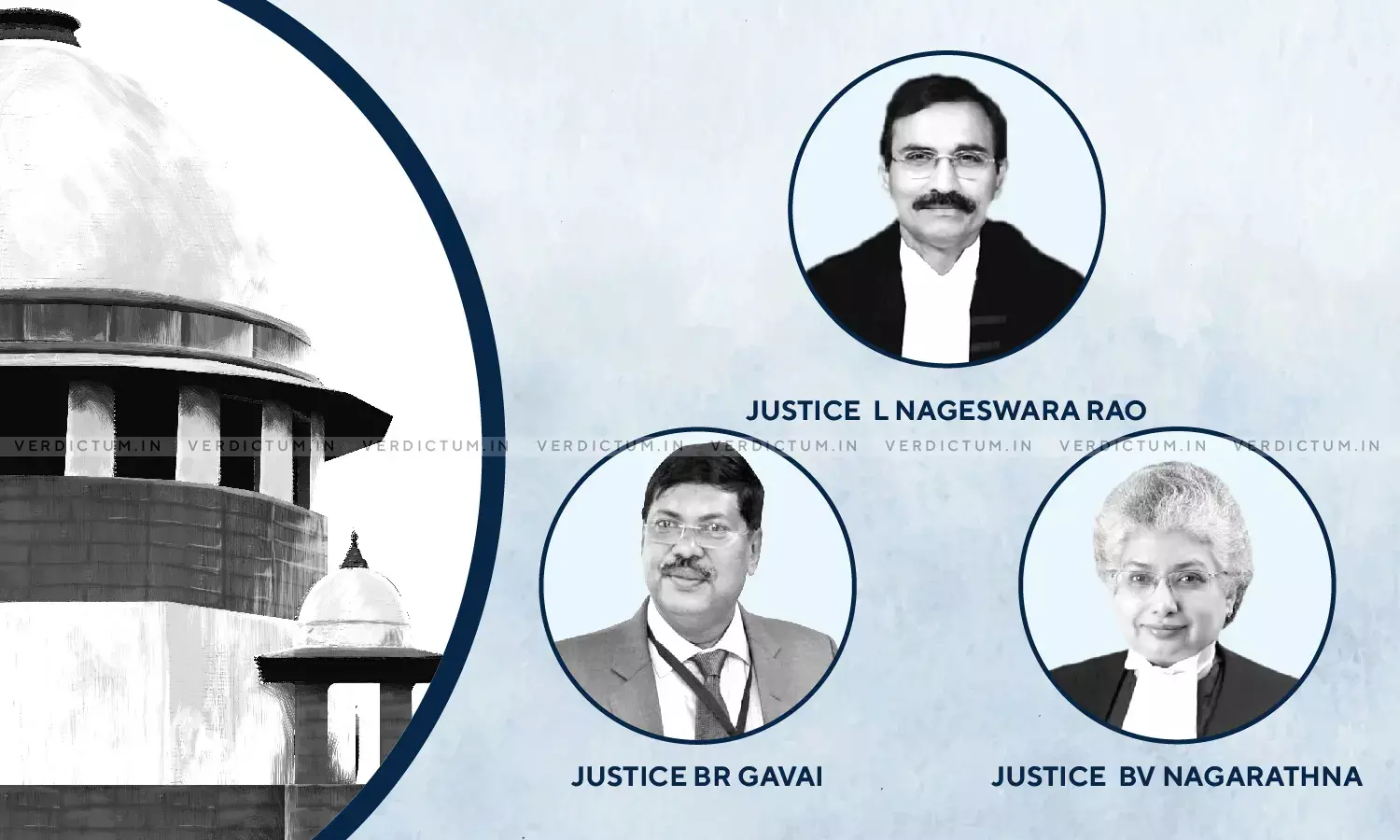Document Of Partition Which Provides For Effectuating Division Of Properties In Future Is Exempt From Registration U/s. 17 (2) (V) Of Registration Act: SC

A three-judge bench of the Supreme Court comprising Justice L Nageswara Rao, Justice BR Gavai, and Justice BV Nagarathna has held that the document in issue did not create rights in specific properties or assets of the family in favor of specific persons, hence it did not require registration.
The Court noted that, therefore, the same did not require registration. The Court made the following crucial observations:
"The test in such a case is whether the document itself creates an interest in a specific immovable property or merely creates a right to obtain another document of title. If a document does not by itself create a right or interest in immovable property, but merely creates a right to obtain another document, which will, when executed create a right in the person claiming relief, the former document does not require registration and is accordingly admissible in evidence vide Ranjangam Iyer v. Ranjangam Iyer, AIR 1922 PC 266."
Counsel Mr. V Prabhkar appeared on behalf of the Appellant while Counsel Mr. KK Mani appeared for the Respondents.
Plaintiff impugned the judgment of the Madras High Court via which the judgment and decree of the First Appellate Court that affirmed the dismissal of the suit by the District Court was sustained.
As per the Plaintiff, Periyaiya Servai and Muthu Servai were sons of Marimuthu. Periyaiya had three sons. Plaintiff, First and Second Defendants, and late Marimuthi have 1/4th share in joint family properties.
Plaintiff averred that Servai had executed a registered will in favor of Plaintiff concerning his share of properties of the joint family. Hence, partition and separate possession were sought.
The District Court, as noted above, dismissed the suit. This was upheld by the First Appellate Court as also by the High Court in the second appeal. It was noted that all joint family properties had already been divided into three shares in favor of Peryaiya and no appeal was preferred against the said judgment.
It was held that the finding concerning the partition had attained finality and hence, the instant underlying suit was barred by res judicata. The second appeal was dismissed at admission.
The Court culled out the question for its consideration as follows:
Whether the suit filed by the plaintiff is barred in view of the judgment and decree passed in A.S. No. 37 of 1993 dated 23rd March 1999, wherein it was held that a partition had been affected in relation to the joint family properties between the first and second defendants and late Marimuthu in the year 1964.
The Court considered, in extenso, the authorities relied upon by the parties.
The Court noted that the award by the pachayatdars was in form of a resolution. The Court noted, "Parties had also stated that they had read the above resolution and had agreed wholeheartedly to obey the provisions thereof."
The Court, on the award, made the following observations:
"On a perusal of the award which is in the form of a resolution, it is clear that there was no right created in any specific item or asset of the joint family properties in any person but the parties resolved to take certain actions in pursuance of a family arrangement. Therefore under Annexure P10 (Ex. B13) there was no right created in favour of any party in any specific item of joint family property. The said document which has been styled as an award is, in our view, only a memorandum of understanding/family arrangement to be acted upon in future. Hence, in our considered view, the said document did not create rights in specific properties or assets of the family, in favour of specific persons. Therefore, the same did not require registration under section 17 (1) (e) of the Act. The said document was in the nature of a document envisaged under section 17 (2) (v) of the Act."
The Court noted that the said award was a mere arrangement to divide the properties in the future by metes and bounds and hence exempted from registration under Section 17(2)(v) of the Act.
The Court held that the award was not a document of title and did not require registration. The Court noted that the order holding that the award was inadmissible in evidence as not registered was incorrect.
The next question that the Court considered was: Whether the finding of the first appellate court in A.S. No. 37 of 1993 that the suit properties were partitioned in the year 1964 is binding on the parties and hence a fresh suit filed by the Plaintiff seeking the very same relief was not maintainable.
It was contended that the plea of res judicata would not arise in the case by placing reliance upon Asrar Ahmed v. Durgah Committee, Ajmer, AIR 1947 PC 1.
Counsel for the Appellant placed heavy reliance on this judgment to contend that when a finding has been given by a lower court based on sufficient evidence, if erroneous, is not binding between the parties to the said proceeding on the principle of res judicata.
The Court noted that the said judgment is not applicable to the present case having regard to the fact that in the instant case there has been no challenge to the finding of partition between the parties till date and the same has attained finality.
The Court noted that the principle of res judicata squarely applies in the present case.
The Court held that the High Court was justified in affirming the judgment of the First Appellate Court as also the Trial Court that dismissed the suit filed by the Appellant. The appeal was, accordingly, dismissed.
Click here to read/download the Judgment

